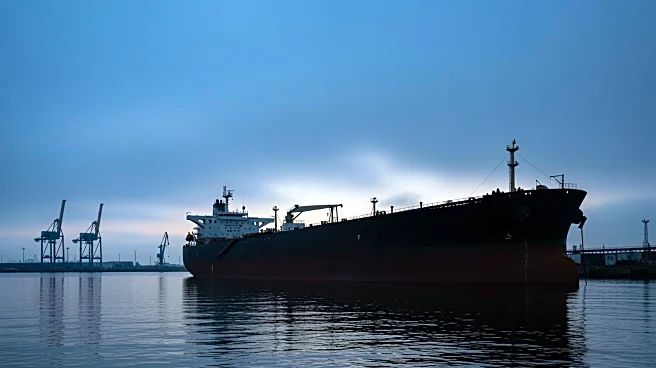What's Happening?
The Indonesian Attorney General's Office is set to auction the Iranian-flagged vessel Arman 114, which was detained over two years ago for conducting illegal ship-to-ship oil transfers. The auction, authorized
by the Batam District Court, aims to dispose of the tanker and its cargo, estimated at 167,000 metric tons of light crude. The vessel, built in South Korea in 1997, has been operating under the Iranian flag since 2019 and is owned by a company incorporated in Panama. Indonesian officials detected the ship alongside another tanker in July 2023, accusing it of causing pollution and spoofing its AIS signal. The captain was tried and convicted in absentia for intentional water pollution, receiving a seven-year prison sentence and a $300,000 fine. The auction is scheduled for December 2, with a minimum bid of $70.5 million.
Why It's Important?
The auction of the Arman 114 highlights ongoing international efforts to enforce sanctions and combat illegal oil trading. The U.S. has sanctioned the vessel due to its involvement in supporting Iran's oil sales through illicit operations. This move underscores the global commitment to uphold sanctions against Iran, aiming to curb its ability to circumvent international restrictions. The auction also reflects Indonesia's active role in addressing maritime violations and environmental concerns, as the vessel was accused of causing pollution during its operations. The sale of the tanker and its cargo could have significant financial implications, potentially impacting oil markets and international trade dynamics.
What's Next?
Following the auction, the buyer will have 30 days to take control and relocate the tanker from its current anchorage near the Riau Islands. The outcome of the auction may influence future enforcement actions against similar vessels involved in illegal activities. Additionally, the international community may continue to monitor and respond to Iran's attempts to bypass sanctions, potentially leading to further diplomatic and economic measures. The case also raises questions about maritime security and the effectiveness of current regulations in preventing illegal oil transfers.
Beyond the Headlines
The situation with the Arman 114 raises broader issues regarding maritime law enforcement and environmental protection. The vessel's activities highlight the challenges in tracking and regulating ship-to-ship transfers, which can be used to obscure the origin and destination of oil shipments. The pollution caused by the tanker underscores the environmental risks associated with such operations, prompting calls for stricter oversight and penalties for violations. The case also illustrates the complexities of international maritime law, as vessels often operate under flags of convenience, complicating accountability and enforcement efforts.










